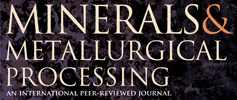Isolation and characterization of a bioflocculant from Bacillus megaterium for turbidity and arsenic removal
Minerals & Metallurgical Processing
, 2015, Vol. 32, No. 4, pp. 222-229
Karthiga Devi, K.; Natarajan, K.A.
ABSTRACT:
A biodegradable flocculant was produced during growth of Bacillus megaterium. The major component of the bioflocculant was found to be a polysaccharide composed of some proteins. Fourier transform infrared (FTIR) spectra analysis revealed the presence of carboxyl and hydroxyl groups in the bioflocculant, and thermal characterization by differential scanning calorimetry (DSC) showed the transition and crystalline melting point at 90-105°C. The effects of bioflocculant dosage and pH on the flocculation of mineral suspensions were evaluated. The bioflocculant exhibited good flocculating capability on mineral suspensions and achieved flocculating efficiencies of 90 percent for kaolinite and 85 percent for hematite suspensions at a dosage of only 5 mL/L. The maximum arsenite removal was found to be 90 percent at a bioflocculant dosage of 2 g/L, which is better than traditional chemical flocculants. This study demonstrates that microbial bioflocculants have potential for application in environmental cleanup, such as in the flocculation of mineral fines and in the remediation of solutions that contain toxic heavy metals.





